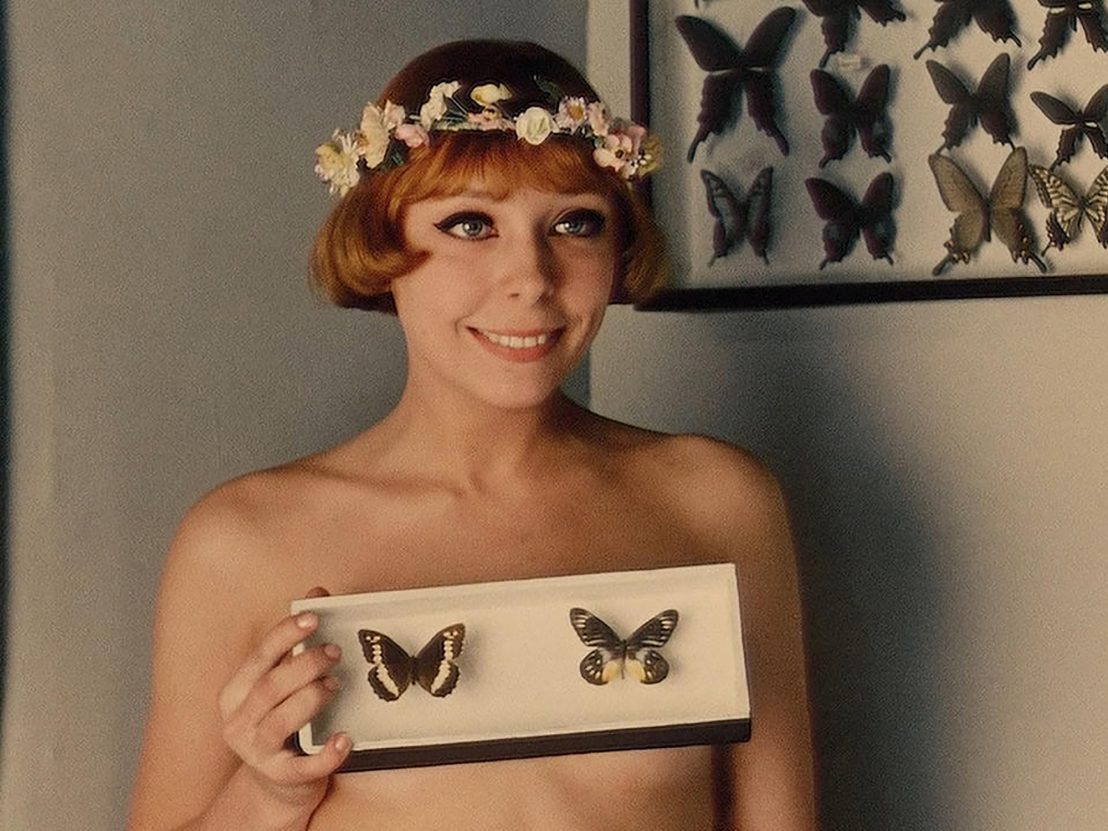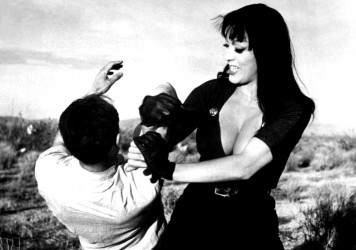
Two young women – one blonde and one brunette – sit on the floor in swimsuits, with their limbs askew. They are passive, doll-like. They eventually rise, lifted up on invisible puppet strings with an added wooden creak to indicate their every movement. So begins Vera Chytilova’s 1996 film Daisies (1966), a playfully subversive take on women’s roles as seen through a jarring, anarchic lens.
Chytilova, often considered a key part of the Czech New Wave, grew up under strict Soviet rule in Czechoslovakia and was raised as a Catholic. This gave her an exhaustive education in the layers of power and patriarchy. She worked various jobs before she forced her way into the Prague Film School, becoming the only female student there. Through most of her life, Chytilova avoided being labeled a ‘feminist’, but make no mistake: Daisies, her impish second feature, is a ripe commentary on gender and hierarchy in her nation.
If that sounds extremely self-serious and academic, Daisies is far from it. The characters run around Prague, pranking older men on dates, getting fall-down drunk, heckling people, and generally laughing at the chaos of the world around them. In a pre-’68 society, where art was dominated by depictions of drudgery, or ‘socialist realism’ as it was termed, this film was an aggressive rejoinder. It culminates in a food fight of epic proportions, and the film was promptly banned for ‘food wastage’, among other things.
In Daisies, form underlines content in a radical manner. Random jump-cuts transport the viewer across time and space. There are abrupt switches from colour to black and white, and the oblique dialogue helps make the proceedings narratively unhinged. But this choppy, expressive approach is riveting. It’s a world away from the predictable stylings of mainstream cinema from the era. The two stars, Jitka Cerhova and Ivana Karbanova, were non-professionals, but little else in Daisies could be said to conform to the ‘verite’ approach. It’s too eccentric; a slice of Dadaist insanity dressed up in girly clothes.
As a filmmaker, Chytilova was infamously demanding – she even admitted to physically attacking her cameramen when they got something wrong. But she also had good reason for exactitude in her work. Living under a totalitarian Soviet regime meant making her films with precise, pointed targets and, with each new project, she placed her career on the line.
Daisies was banned for several years after a Soviet clampdown in 1968, and authorities were probably right to be suspicious. The anarchic spirit of the film – particularly its pre-punk middle finger to the establishment – was summed up by the final dedication in the film: ‘Dedicated to those who get upset only over a stomped-upon bed of lettuce.’ The response was painful: Chytilova was not permitted to make another film in her native country until 1975.
Marie I and Marie II are hardly exemplary. Their excess – clothes in bold colours, extravagant steak dinners, etc – is the pointed antithesis of the ideal Soviet woman. The sartorial elements of the film are strikingly contemporary – tiny babydoll dresses, flower crowns, and thick black eyeliner. The overt girlishness would have seemed strange and slatternly in ‘60s Czechoslovakia. And as if this wasn’t bad enough, there are the darkly comic sexual elements at play: the girls cut up food items that are blatant phallic symbols: sausages, bananas. It’s no wonder the censors were uncomfortable.
Even the characters’ names offer a hint at the archetypal dismissal with which women are treated. Marie I and Marie II are viewed as interchangeable playthings by the older men they date – and annoy. Chytilova understands the feminine decorum expected of women in Czech society, and she undermines it at every turn. The girls laugh loudly, slurp their soup, lick their fingers and misbehave as a way of life. They act childishly, they’re irreverent and wild. Perhaps, most notably, they have enormous appetites for food and for adventure. They take up space and make noise in a society which has forbidden them from doing so.
Irrespective of the film’s political specifics, it’s this rebellious spirit that feels so fresh. In an interview from 1967 with writer Antonin J Liehm, Chytilova said: “We are still living as guests in a man’s world.” If this is so, the two women of Daisies are the world’s worst guests. They jump on the furniture and swing from the chandeliers. A half century later, it’s still invigorating to see them do so.
Daisies plays as part of Light Show #1 – a season of films on 35mm curated by MUBI, the ICA and Little White Lies. The film screens on Saturday 9 December at 2pm. Book tickets here.
Published 5 Dec 2017

Join us at ICA London for three days of celluloid miracles, including films by Orson Welles and Agnés Varda.

How many ’60s exploitation movies have you seen where women get to smoke, drink, drive and fight?

The actor brought us to tears at her recent London Film Festival symposium.